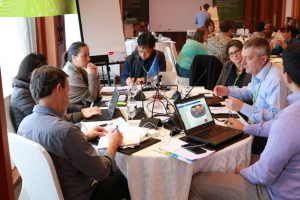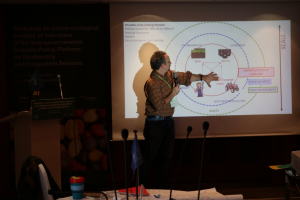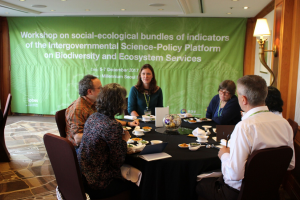The contribution of GEO BON Ecosystems Services Workgroup to IPBES Global Assessment: Socioecological indicators helped tell the full story of biodiversity loss on human wellbeing
Contributed by Tuyeni H. Mwampamba, Patricia Balvanera, Berta Martín-López and Ilse R. Geijzendorffer
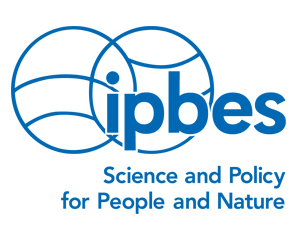 In the week between April 29th and May 3rd of 2019, fourteen years after the publication of the Millenium Ecosystem Assessment, delegates from 132 countries met in Paris to revise and debate another global-scale assessment: IPBES’ report on the Global Assessment of Biodiversity and Ecosystem Services. Prepared by more than 300 global experts, the report uses the best available science and evidence to update our understanding of the global status and trends of biodiversity and ecosystem services of the past 50 years. Additionally, the report identifies the key drivers of global biodiversity loss and ecosystem degradation, it assesses the effectiveness of international environmental agreements at achieving existing objectives, and it describes pathways for transformative change. Consequently, the key messages emerging from the Global Assessment Report tell a complete and robust narrative of where we are, why we are where we are, and how to get out of the mess. With discussions lasting up to 3 AM on some days, the Summary for Policy Makers, the document containing the key messages of the report and the background information substantiating the key messages, was finally approved on Friday the 3rd of May followed by a media launch that took place on Monday, 6th of May 2019.
In the week between April 29th and May 3rd of 2019, fourteen years after the publication of the Millenium Ecosystem Assessment, delegates from 132 countries met in Paris to revise and debate another global-scale assessment: IPBES’ report on the Global Assessment of Biodiversity and Ecosystem Services. Prepared by more than 300 global experts, the report uses the best available science and evidence to update our understanding of the global status and trends of biodiversity and ecosystem services of the past 50 years. Additionally, the report identifies the key drivers of global biodiversity loss and ecosystem degradation, it assesses the effectiveness of international environmental agreements at achieving existing objectives, and it describes pathways for transformative change. Consequently, the key messages emerging from the Global Assessment Report tell a complete and robust narrative of where we are, why we are where we are, and how to get out of the mess. With discussions lasting up to 3 AM on some days, the Summary for Policy Makers, the document containing the key messages of the report and the background information substantiating the key messages, was finally approved on Friday the 3rd of May followed by a media launch that took place on Monday, 6th of May 2019.
At its core, the assessment consists of a thorough review of key indicators that inform on important changes that have occurred not only in the ecosystem component of ecosystem services, but also in the socioeconomic, sociopolitical, institutional and wellbeing components. From the onset of the assessment in 2016, while it was relatively ‘easy’ to identify preexisting standard indicators that could be used to tell the global story of biodiversity and ecosystems status and trends, the same could not be said of indicators that inform on other components of IPBES’s conceptual framework: the socioecological. Hence, it was quickly recognized that there were fewer indicators immediately available to complete the narrative, i.e., the links between Nature and Nature Contributions to People, the impact on human quality of life, co-production of NCPs between nature and humans, and the central role of institutions in mediating human-nature relations. To address this, GEO BON ecosystem services workgroup in joined forces with Future Earth’s Biodiscovery, Ecoservices and PECS programs, and the IPBES Technical Support Unit on Knowledge and Data in a collaborative effort to identify socioecological indicators that could be used in the Global Assessment.
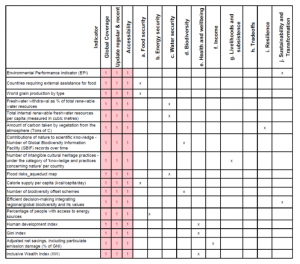
Under the leadership of Patricia Balvanera and Cornelia Krug a set of 17 core socioecological indicators (Table 1) were selected from an initial list of approximately 100 indicators that had been presented to member of IPBES’ Multidisciplinary Expert Panel and the IPBES Secretariat. The commonality across the set of 17 is that they a) the have global coverage, b) they are updated regularly, for the whole planet with national (or finer) resolution, and c) that they are freely accessible. In combination, the indicators inform on different dimensions of human well-being and the interactions between nature and society. To arrive at the 100 indicators, several workshops and meetings were held between 2015 and 2017, including an important workshop at the 2016 GEO BON all-hands meeting that solicited the opinions of meeting participants, and meetings in Budapest and Seoul to test and operationalize the use of the indicators. Thanks to the culmination of these efforts, the Global Assessment is not only able to tell a profound story of how the quality of nature is decreasing at unprecedented rates, but also the parallel story of what this means for different dimensions of human quality of life and the role that our institutions and policies have had in contributing to existing trends.

